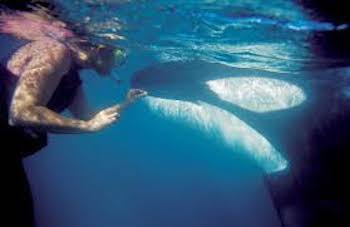Orcas are sophisticated and highly lethal killing machines. Working together, they can take almost any kind of potential prey the ocean has to offer. They don’t shy away from animals far more dangerous than a human swimmer could ever be. Yet there has never been a single recorded instance of an attack on one of us in the wild. Why not? This seems to defy the odds. What prevents them from taking advantage of such an easy dietary option?
It comes down to how orcas decide what qualifies as food, and how they share that knowledge amongst themselves.
We can begin with their exceptional intelligence. They are among a very small number of animals tested that have displayed a capacity for self-awareness. (Other dolphin species similarly qualify, but it’s a very short list). Next, consider that while all animals have the ability to communicate in some way, orcas possess actual language skills, which is extremely rare. And the languages they use among themselves are incredibly sophisticated.
Parenting is another area in which orcas tend to resemble us. For the first two years of its life an orca calf will rarely leave its mother’s side. In that time a great deal of knowledge is transmitted to the youngster, without which survival would be impossible. This is true of many other species, but because of the orcas’ intelligence and language skills, what’s taught is very detailed. It’s also highly specialized to meet the demands of the immediate environment that particular pod inhabits.
What’s more, knowledge specific to the pod passes from one generation to the next. When an animal is capable of learning in this way, it eliminates the need to experience any given situation personally and first-hand. Very few animals have attained this ability. It means that different pods have their own habits, preferences, and specialized diets. For example, the Southern Residents focus primarily on salmon, while pods further north up the BC coast will invest more of their hunting strategies on seals. In both cases, a young orca doesn’t need to experience what might happen in trying to eat something poisonous like a lionfish, or that might be dangerous, like a blowfish. If another member of the pod already knows this, he or she would have already taught the others. This ability to pass on information confers huge advantages.
Orcas don’t instinctively hunt anything that’s moving, assuming it’s food. They use what they’ve been taught, and act on this counsel to make a decision. When it comes to their food, they know exactly what they’re looking for – just as you would look at a bush and know to eat the berries, but not the branches or the leaves.
So why aren’t humans food? Because none of them have been taught that humans are food. And they aren’t going to mistake us for something they do eat, like maybe a sea lion. They have the intelligence to easily tell the difference.
No doubt there are many things that might further disqualify humans as food in the “orcas’ body of knowledge”. Certainly we must look very alien compared to the compact creatures that inhabit their world – creatures without our long appendages that are unsuited to navigating their watery world. Or maybe we’re not blubbery enough, or simply muscular enough to present an attractive option to bite off the meat from around our bones. Whatever the reason, they do not see us as an attractive menu option. There are a number of other things in the ocean that they won’t eat, and we just happen to be one of those things.
As I’ve already mentioned, there has never been one recorded instance of a wild orca eating or otherwise deliberately harming a human being. Not ever. When these majestic and magnificent beings are left to swim free, without the emotional stress and despair that comes with confinement in a concrete tank, they do not attack us. Even the fact that they so rarely do in the context of captivity is rather surprising, given what’s been taken from them, and all of the constraints that have been imposed on them.
Let’s leave them where they belong, with their family units and free to choose to live their lives as they please. They mean us no harm. We owe them the same.
For The Orca’s Voice,
Anna, Canadian Cetacean Alliance



Leave a Reply